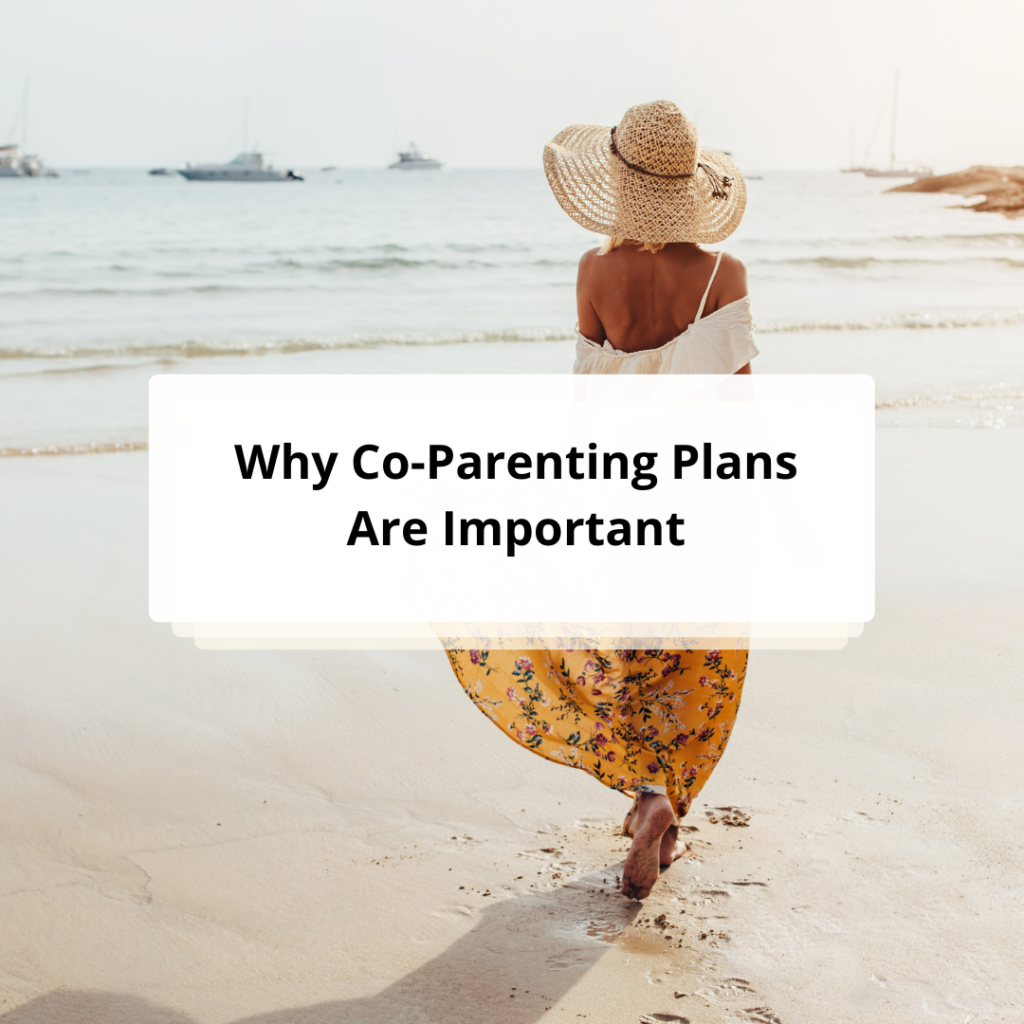As a divorce coach, I have seen many cases where high-conflict divorces lead to contentious co-parenting arrangements. Despite the difficulties of navigating these situations, creating a solid co-parenting plan is possible even during a difficult divorce.
It’s not uncommon for couples going through a divorce to face strong feelings such as anger, resentment, and hurt, especially if abuse is involved in the relationship. These feelings can make it challenging for them to communicate effectively, if at all, with each other or work together to create an effective co-parenting plan.
But remember: just because you’re getting divorced doesn’t mean you won’t be parenting together anymore! Creating a solid co-parenting plan ensures both parties can move forward after the divorce.
Understanding The Importance Of A Co-Parenting Plan
It’s important for parents going through a high-conflict divorce to create boundaries and communication plans to create an effective co-parenting plan.
It’s important to find possible triggers, such as specific topics or behaviors, that could lead to a conflict between parents.
By communicating effectively and setting boundaries, parents can make sure the child’s best interests are met, and they are kept safe.
I strongly encourage parents to work together to develop a plan to reflect both parents’ needs. Of course, some situations involve domestic abuse, narcissistic abuse, and other problems that make it difficult for parents to work together. As a divorce coach, I work with my clients to help them develop a plan that best suits the situation’s needs.

Establishing Boundaries
As a divorce coach, I have seen firsthand the damage that can be inflicted on children and families in a high-conflict divorce.
Establishing clear boundaries through your co-parenting plan is one of the most important tools for managing a high-conflict divorce. This means outlining specific communication, decision-making, and parenting time guidelines to avoid misunderstandings or power struggles. While I understand some situations make this difficult, having clear boundaries and a solid parenting plan can reduce some of these problems.
When creating a co-parenting plan in a high-conflict divorce, it’s necessary to consider all possible situations and anticipate potential conflicts. Establishing boundaries helps both parents understand their roles and responsibilities while reducing the likelihood of disagreements.
Clear communication channels like parenting apps are also essential in establishing healthy co-parenting strategies. Setting expectations from the beginning can minimize confusion and keep everyone focused on what truly matters: providing stability and support for your children.

Communication Strategies
Communication strategies are important in creating an effective co-parenting plan for high-conflict divorce. Establishing clear communication channels and setting expectations from the beginning is important to minimize confusion and potential conflicts.
When parents communicate effectively, they can reduce misunderstandings, build trust, and maintain healthy relationships that benefit their children. In high-conflict divorces, it’s common for one or both parties to have difficulty communicating with each other. Emotions run high, and lingering feelings of hurt or anger and ongoing abuse may make it hard to work together as co-parents.
Key Components Of A Successful Plan
Creating a Schedule: Establishing a regular schedule for your children’s lives is important, including time with each parent.
Making Decisions: Both parents need to be involved in major decisions regarding the children’s lives.
Financial Responsibilities: Each parent should provide financial support for the children.
Creating a Schedule: This should include clear expectations for when the children will be with each parent.
Making Decisions: It’s important to make decisions together, rather than one parent making decisions unilaterally.
Financial Responsibilities: This should include providing basic needs, such as food, clothing, and medical care.

Creating A Schedule
A well-defined schedule is one of the most important parts when creating a co-parenting plan for high-conflict divorce. As a divorce coach, I strongly recommend that parents get as detailed and specific as possible when scheduling custody time.
This means specifying which parent will have the children on particular days and when. This also includes defining how exchanges will be made for visits, how, if at all, making changes to the schedule happens, and who has the final decision-making in cases where there are disagreements. Including these things in your co-parenting plan can help reduce stress and confusion over custody arrangements while providing both parents with clear guidelines to follow.
Creating a successful co-parenting plan requires careful consideration of all the important things needed to make it work. When it comes to scheduling custody time in high-conflict divorces, transportation responsibilities should also be included in your plan.
It’s important to determine who will be responsible for picking up and dropping off the children during exchanges and any other important travel arrangements needed. If high levels of conflict exist between the parents involved, reconsider using the right of first refusal clause since this may only add more tension to an already difficult situation. As a divorce coach, I know many want this in their plans, but it can cause resentment, arguments, and problems between the parents.
To ensure success in high-conflict divorce situations, communication guidelines must be settled before creating your co-parenting plan; this allows both parents to be respectful towards one another, even during disagreements or misunderstandings concerning parenting decisions related to the child(ren). Of course, I realize there are some in high-conflict divorces where any kind of communication is difficult at best, and creating a co-parenting plan may have to be worked out in other ways.
Making Decisions
When navigating co-parenting in a high-conflict divorce, making decisions is another necessary part of creating a successful plan.
The parenting plan should state how the parents will make big decisions for their child(ren) and if the parent with physical custody will make daily decisions.
It’s important to be specific about decision-making responsibilities to avoid any confusion or misunderstandings that may lead to further conflicts between parents.
It’s also important to include how additional parenting responsibilities, such as handling the child’s illness, school meetings, religious education, etc., will be managed. Of course, each parent should be involved, but this needs to be spelled out in some cases.
As a divorce coach, I understand that financial responsibilities are another important component when creating a co-parenting plan for high-conflict divorce.
Parents need to decide how they will pay for things not covered by child support and specify this in their plan. Include who pays what percentage, how long the other parent has to pay, and do you both have to agree on the expense. These include sports, cars, school supplies, college, and activities.
Disputes are inevitable in any co-parenting situation; because of this, it’s necessary to have a way to resolve them out of court. Some options are mediation, arbitration, or other methods agreed upon by both parties.
Putting some of these co-parenting strategies into your plan allows you to navigate co-parenting after divorce while minimizing stress and tension between parents.
Financial Responsibilities
When it comes to financial responsibilities are also a key component when creating an effective co-parenting plan in high-conflict divorce situations.
As a divorce coach, I understand that parents involved in a high-conflict divorce must figure out how they will pay for things not covered by child support. This should also be explicitly addressed in their plan. Some items include expenses such as extracurricular activities, medical bills, school fees, and other things.
Besides dealing with child support and other financial items, it’s important to either find a way or agree on financial issues.
High-conflict divorce can create challenges when managing finances since both parties may have different ideas about what is fair or reasonable. A clear agreement outlined in the co-parenting plan will help reduce the conflict regarding these things.

Strategies For Effective Communication And Cooperation
Communication and cooperation are important for successful co-parenting. Still, in a high-conflict divorce, that can be difficult at best. Co-parents should try to learn how to work together to make decisions that are in the children’s best interest, even when they may not see eye-to-eye.
Using a parenting app, such as Our Family Wizzard, Talking Parents orAppClose, can help you organize all communication, calendars, and expenses in one place. This can help communication and conflict between the parents
Creating a shared parenting calendar outlining important dates and events so both parents are aware of activities and schedules
Effective co-parenting requires an ongoing effort from both parents. Using parenting apps and a shared calendar can help divorcing parents can create good communication despite the challenges of high-conflict divorce.
Parents can avoid misunderstandings and disputes by creating a clear outline. Mediation can also help address any ongoing conflicts or disagreements in a neutral setting where both parties can express their concerns and work towards a resolution. By taking these proactive steps, high-conflict divorcing couples can lessen the negative impact on their children as they move forward into co-parenting.
| Parent 1 | Parent 2 |
|---|---|
| Parenting Time: Every other weekend and one evening during the week starting at 6pm. | Parenting Time: Every other weekend and one evening during the week starting at 6pm. |
| Decision-Making Authority: Final decisions on education related matters. | Decision-Making Authority: Final decisions on healthcare related matters. |
| Communication: Email or text regarding scheduling changes with minimum notice of 24 hours. | Communication: Phone call or text regarding emergencies only outside of scheduled pick-up/drop-off times. |
By creating a clear outline, parents can avoid misunderstandings and disputes down the line. Mediation can also be helpful in addressing any ongoing conflicts or disagreements in a neutral setting where both parties can express their concerns and work toward resolution. By taking these proactive steps, high-conflict divorcing couples can lessen the negative impact on themselves and their children as they move forward into co-parenting.

Seeking Professional Support And Resources
Oh, you thought co-parenting with your ex-spouse would be a breeze? You agreed to put the kids first and work together for their sake. But now, every interaction feels like walking on eggshells, and every decision turns into an argument. Welcome to the world of high-conflict divorce.
But don’t worry, there are professionals who can help you navigate this difficult situation. Seeking support from experienced lawyers, mediators, or coaches can make all the difference in creating a successful co-parenting plan that works for everyone involved.
Here are some resources to consider:
- High-conflict divorce lawyers: These attorneys specialize in handling contentious divorces and can provide legal guidance throughout the process.
- High conflict divorce mediators: Mediators act as neutral third parties who facilitate communication between couples and help them reach agreements outside of court.
- Divorce coaches: These professionals offer emotional support and practical advice during the divorce process, helping clients manage stress and stay focused on achieving their goals.
- Parent coordinators: The court appoints a parent coordinator to assist parents in resolving custody disputes.
- Co-parenting classes: Taking a class specifically designed for co-parents can improve communication skills and establish positive parenting practices.
Remember, seeking professional support doesn’t mean you’ve failed at co-parenting. It means you’re taking proactive steps to create a healthy environment for your children despite any conflicts that may arise.
Don’t hesitate to ask for help – it could make all the difference in your journey toward successful co-parenting.
Conclusion
As a divorce coach, I understand that high-conflict divorces can make co-parenting seem impossible. Putting your children’s best interests first is important in creating an effective co-parenting plan.
By including important items such as clear communication with a parenting app, mutual respect, and flexibility, if possible, in your plan, you can hopefully build a good co-parenting plan with your ex-spouse.
Creating a co-parenting plan seems discouraging or overwhelming. But remember, seeking professional support and resources can provide valuable guidance throughout this process.
With effort from both parties, a co-parenting relationship is possible despite high-conflict divorce situations. Don’t let the challenges discourage you from prioritizing your children’s happiness and stability post-divorce.




[…] are available to help them navigate this complicated process. That’s where ‘Navigating High Conflict Divorce: A Comprehensive Guide’ comes […]
[…] solid co-parenting plan can help reduce stress and conflict while providing your children with as much stability and […]